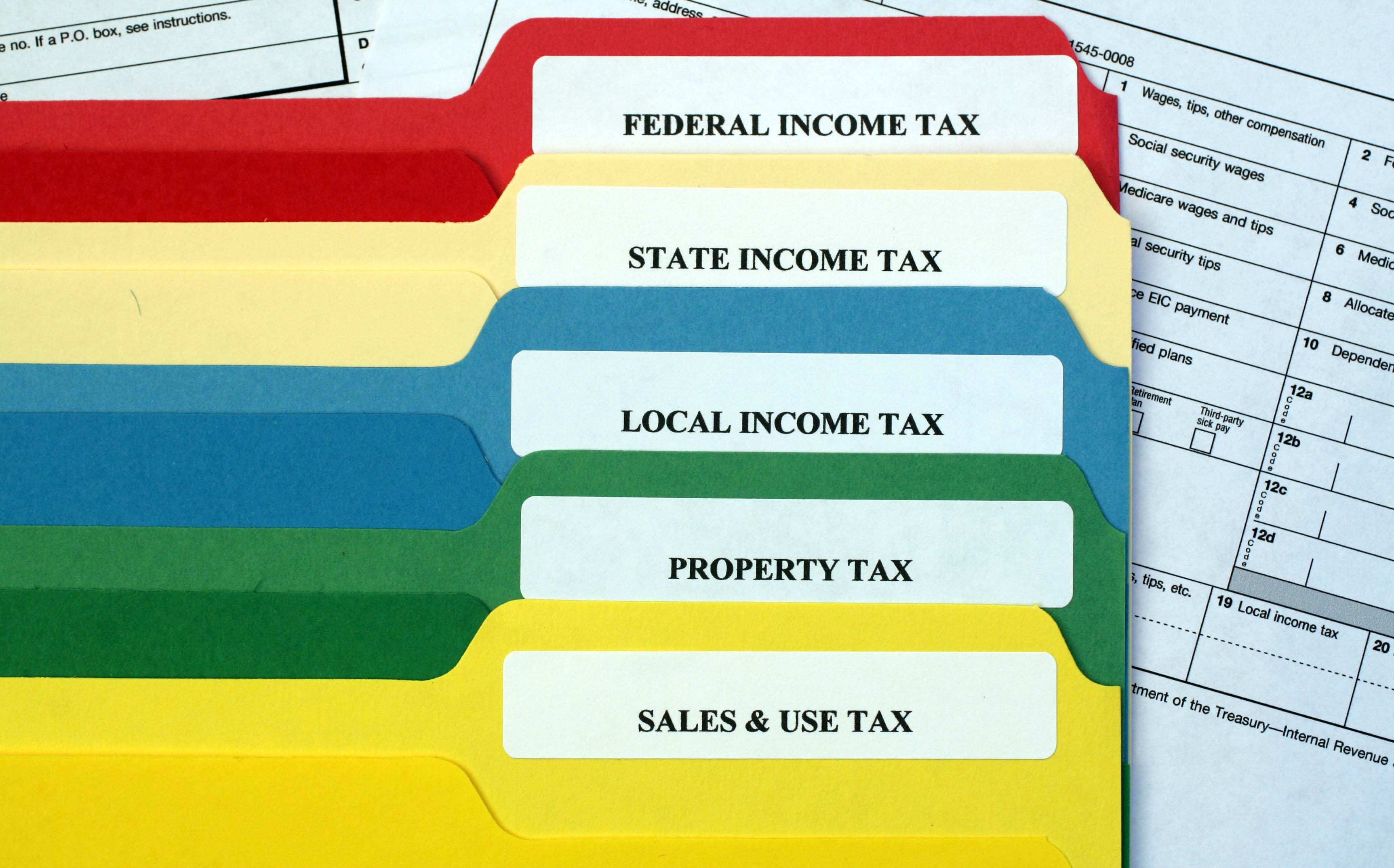11 Overlooked Tax Deductions and Credits
Don’t miss these often overlooked tax deductions and credits when you file your tax return this year.

Kate Schubel

Profit and prosper with the best of Kiplinger's advice on investing, taxes, retirement, personal finance and much more. Delivered daily. Enter your email in the box and click Sign Me Up.
You are now subscribed
Your newsletter sign-up was successful
Want to add more newsletters?

Delivered daily
Kiplinger Today
Profit and prosper with the best of Kiplinger's advice on investing, taxes, retirement, personal finance and much more delivered daily. Smart money moves start here.

Sent five days a week
Kiplinger A Step Ahead
Get practical help to make better financial decisions in your everyday life, from spending to savings on top deals.

Delivered daily
Kiplinger Closing Bell
Get today's biggest financial and investing headlines delivered to your inbox every day the U.S. stock market is open.

Sent twice a week
Kiplinger Adviser Intel
Financial pros across the country share best practices and fresh tactics to preserve and grow your wealth.

Delivered weekly
Kiplinger Tax Tips
Trim your federal and state tax bills with practical tax-planning and tax-cutting strategies.

Sent twice a week
Kiplinger Retirement Tips
Your twice-a-week guide to planning and enjoying a financially secure and richly rewarding retirement

Sent bimonthly.
Kiplinger Adviser Angle
Insights for advisers, wealth managers and other financial professionals.

Sent twice a week
Kiplinger Investing Weekly
Your twice-a-week roundup of promising stocks, funds, companies and industries you should consider, ones you should avoid, and why.

Sent weekly for six weeks
Kiplinger Invest for Retirement
Your step-by-step six-part series on how to invest for retirement, from devising a successful strategy to exactly which investments to choose.
Tax season is underway, and if you’re not careful, there are a few tax credits that you may be missing out on.
The IRS expects more than 160 million individual tax returns for the 2025 tax year to be filed before the April 15 deadline. From family tax credits for dependents and children to deductions on student loan interest or your mortgage, there are tax breaks available to help you navigate each stage of life.
If you qualify, claiming the deductions and credits on this list could lower your tax bill or — in some cases — result in a tax refund. In no particular order, here are eleven tax deductions and credits you might be able to claim during the 2026 tax season.
New: Can I Deduct My Pet On My Taxes?
Overlooked deductions and credits
There are several tax deductions and credits that are often overlooked by taxpayers because they don’t know that they exist.
Some of the tax deductions below require you to itemize deductions. While most people take the standard deduction, itemizing can result in a higher deduction for some.
To determine which option is best for you, calculate all your allowable itemized deductions. If the total is higher than the standard deduction for your filing status for the 2025 tax year, itemizing deductions might be a good option.
Related: A Bunch of IRS Tax Deductions and Credits You Need to Know.

1. Charitable donations tax deduction
If you itemize deductions, don’t forget about all the charitable contributions you made throughout the year. These can include cash, property (for example, art and home furnishings), and even out-of-pocket expenses incurred for volunteer work. You may have even made some tax-savvy donations during the holiday season.
When reviewing charitable donations, you can only deduct qualifying donations from an IRS-recognized tax-exempt organization or 501(c)3.
If you had to drive for your volunteer work, you could deduct expenses in one of two ways.
- Deduct the actual cost of gasoline.
- Deduct 14 cents per mile.
Just remember: Keep receipts from charitable organizations and good records of your contributions and your mileage (or fuel) costs.
Also, keep in mind that not every donation is considered tax-deductible. To deduct a contribution on your tax return, the charity must be an approved tax-exempt organization. You can use a search tool on the IRS website to see which organizations qualify.
Additionally, the IRS imposes additional requirements when donating gifts worth $250 or more. IRS Publication 1771 details requirements for making tax-deductible charitable contributions.
For more information, see the Tax Deduction for Charitable Contributions.

2. Student loan interest deduction
No one likes paying student loan interest, but doing so might save you money at tax time.
That’s because you can deduct up to $2,500 (or the actual amount, whichever is less) of the interest paid on qualified student loans in 2025. The interest paid can be on any qualified student loan that you took out for yourself, a spouse, or someone who was dependent at the time you took out the loan. And the best part is you can take the student loan interest deduction even if you don’t itemize deductions when you file.
However, not everyone who paid student loan interest is eligible to deduct student loan interest payments on their 2025 federal tax return (taxes generally filed early 2026).
- You can’t deduct student loan interest if you’re married and filing separately.
- If you or your spouse (if filing jointly) is claimed as a dependent on another tax return, you can’t take the student loan interest deduction.
- Additionally, some higher-earning taxpayers are disqualified from deducting student loan interest.
Can you deduct student loan interest paid by a parent? Taxpayers can also deduct student loan interest if a parent pays their student loans, as long as they can no longer be claimed as a dependent.
If you paid more than $600 in qualified student loan interest in 2025, you should have received a Form 1098-E.
For more information, see Don’t Miss This Up to $2,500 Tax Break for Paying Your Student Loan.

3. Retirement savings contribution tax credit
Contributions to traditional IRAs and 401(k)s aren’t taxed, but some people who contribute to these (and select other) retirement accounts qualify for even bigger tax breaks.
Better known as the Saver’s Credit, the retirement savings contribution tax credit allows eligible filers to claim a tax credit worth up to $1,000 ($2,000 if married filing jointly).
The amount of the credit depends on your contribution amount, your filing status, and your adjusted gross income (AGI). If your 2025 AGI exceeds the income thresholds below, you aren’t eligible to claim the Saver’s Credit.
- $79,000 for joint filers.
- $59,250 for head of household filers.
- $39,500 for all other filers.
For more information, see The Saver’s Credit: Who Qualifies for This Retirement Tax Break?

4. Gambling Losses
Gambling winnings, which include lottery winnings from Mega Millions and Powerball, are considered taxable income. However, winners can reduce their tax liability by deducting gambling losses. Lottery losses aren’t the only types of losses that qualify.
- Losses for scratch-off tickets are deductible.
- Losses from gambling at a casino are deductible.
- Even losses from betting on the Super Bowl or races qualify as deductible expenses.
However, there are a few catches. Taxpayers can only deduct gambling losses if they itemize, and they can’t deduct losses that exceed their winnings for tax year 2025. (Starting in 2026, gambling losses may only be deducted up to 90% of winnings, though President Donald Trump is currently eying a change to gambling tax policy.)
For more information, see: Taxes on Gambling Winnings and Losses.

5. Tax credit for other dependents
Some taxpayers can receive tax credits for dependents, regardless of age. For example, while the child tax credit only applies to qualifying dependents under age 17, older children and even adults could be considered qualified dependents for the purpose of claiming the tax credit for other dependents.
- The credit is worth up to $500 for each qualifying dependent.
- However, the same dependent cannot qualify for both the child tax credit and the credit for other dependents.
- The IRS has a tool that taxpayers can use to determine whether or not their dependent qualifies for the tax credit for other dependents.
Note: To qualify as a "qualifying relative" for this credit in tax year 2025, the dependent's gross income must be less than $5,200 (up from $5,050 last year).
Speaking of family tax credits, there’s a federal tax break available for low- and moderate-income workers with or without children. The Earned Income Tax Credit (EITC) is refundable, and the amount depends on your filing status and the size of your household.
For instance, a single filer with no children and an income up to $19,330 can earn a maximum credit of $649 for 2025, while families with three or more children can receive a maximum credit of $8,046.
For more information, see: Earned Income Tax Credit (EITC): How Much Will You Get?

6. Tax deduction for jury pay
Some employers require employees to surrender jury pay. This can occur when an employee continues to receive their regular salary while serving jury duty.
Jury pay is considered taxable income by the IRS, but any amount surrendered to an employer is tax-deductible.
Taxpayers can deduct surrendered jury pay, whether or not they take the standard deduction, but the IRS does not allow a tax deduction for jury pay that the employee keeps.

7. Child and dependent care credit
While several taxpayers know the child and dependent care credit exists, some might miss out because they don’t think their child care expenses qualify. You can use more than traditional daycare expenses to calculate the credit.
- Summer day camp expenses qualify for the credit.
- Preschool tuition is a qualified childcare expense.
- Even payments you make to relatives who babysit could qualify as an expense (excluding your spouse, the parent of the child, a dependent you will claim on your return, or your child if under the age of 19).
Taxpayers can receive a nonrefundable credit of between 20% and 35% of up to $3,000 ($6,000 for two qualifying dependents) of qualifying childcare expenses. To qualify for the child and dependent care credit, the expenses must have been incurred so you (and your spouse if filing jointly) could work or look for work.
Additionally, dependents over age 13 are not considered qualified dependents for the purpose of claiming the credit. However, care expenses for a dependent with a disability may qualify, regardless of age.
For more information, see Kiplinger's report Child and Dependent Care Credit: How Much Is It?

8. SALT deduction
The state and local tax (SALT) deduction allows taxpayers to deduct state and local taxes paid to certain governments. This deduction is only available to those who itemize rather than take the standard deduction.
The latest Trump tax overhaul has significantly raised the limit: you can now write off up to $40,000 ($20,000 if married and filing separately) of eligible taxes paid, which may include the following:
- State income taxes or state and local sales taxes (not both).
- Real estate taxes.
- Personal property taxes.
It’s important to note that there is a new income-based phaseout for this higher cap.
If your modified adjusted gross income (MAGI) exceeds $500,000, the $40,000 limit begins to decrease by 30 cents for every dollar over that threshold, eventually reverting to the old $10,000 limit once you hit $600,000.
A qualified tax professional can help you determine which taxes you paid in 2025 are deductible.
For more information, see: SALT Deduction: Three Things to Know Now.

9. Deducting mortgage points
You may know that you can deduct mortgage interest, but mortgage points (sometimes referred to as loan origination fees, maximum loan charges, loan discount, or discount points) are also tax-deductible for those who itemize deductions.
If more than $600 of mortgage interest was paid in 2025, homeowners will receive a Form 1098 from their lender, which will also include mortgage points paid. However, interest and mortgage point amounts reported on the form might differ from the amounts you can deduct this year.
The IRS has specific rules for who can claim mortgage points in the year they were paid and who can’t. In addition to other requirements, taxpayers must deduct points over the life of the loan if either of the following applies:
- The points were paid to refinance a mortgage
- The points for a second home
Homeowners can use a tool on the IRS website to determine whether their mortgage points are fully deductible for a given tax year.
Here's a new change to keep an eye on: The 2025 Trump tax bill permanently reinstated the deduction for mortgage insurance premiums (PMI). While this officially takes effect for the 2026 tax year (returns filed in early 2027), you should check your 2025 Form 1098 closely. Some lenders might begin reporting these figures early in anticipation of the new rules.

10. Tax-deductible moving expenses
Moving expenses are only tax-deductible for members of the U.S. Military. Additionally, only expenses incurred for moves due to a military order and for a “permanent change of station” are deductible.
However, if any of the following apply, the spouse of an Armed Forces member may also qualify to deduct moving expenses.
- The service member deserts.
- The service member is imprisoned.
- The service member dies.
Unreimbursed relocation costs incurred for returning home from a post of active duty qualify as tax-deductible for service members and their spouses. For more information, see IRS instructions for Form 3903.

11. Self-employed health insurance deduction
Most self-employed people know about the home office deduction, but they may overlook a bigger benefit: deducting up to 100% of health, dental, vision, and long-term care premiums from their federal taxes. The deduction can be taken for themselves, spouses, dependents, and non-dependent children under age 27.
To qualify for the health insurance premium deduction for the self-employed:
- You must have net earnings from self-employment.
- You cannot be eligible for an employer-subsidized health plan (either your job or a spouse's).
- Your deduction must not exceed your net earned income from the business.
Itemization is not required. However, self-employed health premiums may still be subject to the self-employment tax. To learn more about self-employment taxes, check out Kiplinger's guide: 12 Tax Strategies Every Self-Employed Worker Needs in 2026.
Read More
- Earned Income Tax Credit (EITC): How Much Will You Get?
- Family Tax Credits: Four IRS Changes That Can Save You Money
- Adoption Tax Credit: What You Need to Know
- Don't Overpay the IRS: 6 Tax Mistakes That Could Be Raising Your Bill
Profit and prosper with the best of Kiplinger's advice on investing, taxes, retirement, personal finance and much more. Delivered daily. Enter your email in the box and click Sign Me Up.

Katelyn has more than 6 years of experience working in tax and finance. While she specialized in tax content while working at Kiplinger from 2023 to 2024, Katelyn has also written for digital publications on topics including insurance, retirement, and financial planning and had financial advice commissioned by national print publications. She believes knowledge is the key to success and enjoys providing content that educates and informs.
- Kate SchubelTax Writer
-
 5 Vince Lombardi Quotes Retirees Should Live By
5 Vince Lombardi Quotes Retirees Should Live ByThe iconic football coach's philosophy can help retirees win at the game of life.
-
 The $200,000 Olympic 'Pension' is a Retirement Game-Changer for Team USA
The $200,000 Olympic 'Pension' is a Retirement Game-Changer for Team USAThe donation by financier Ross Stevens is meant to be a "retirement program" for Team USA Olympic and Paralympic athletes.
-
 10 Cheapest Places to Live in Colorado
10 Cheapest Places to Live in ColoradoProperty Tax Looking for a cozy cabin near the slopes? These Colorado counties combine reasonable house prices with the state's lowest property tax bills.
-
 10 Cheapest Places to Live in Colorado
10 Cheapest Places to Live in ColoradoProperty Tax Looking for a cozy cabin near the slopes? These Colorado counties combine reasonable house prices with the state's lowest property tax bills.
-
 Avoid a Tax Surprise After Your 2026 Super Bowl Bets: A New IRS Rule to Know
Avoid a Tax Surprise After Your 2026 Super Bowl Bets: A New IRS Rule to KnowTaxable Income When Super Bowl LX hype fades, some fans may be surprised to learn that sports betting tax rules have shifted.
-
 Should You Do Your Own Taxes This Year or Hire a Pro?
Should You Do Your Own Taxes This Year or Hire a Pro?Taxes Doing your own taxes isn’t easy, and hiring a tax pro isn’t cheap. Here’s a guide to help you figure out whether to tackle the job on your own or hire a professional.
-
 Trump $10B IRS Lawsuit Hits an Already Chaotic 2026 Tax Season
Trump $10B IRS Lawsuit Hits an Already Chaotic 2026 Tax SeasonTax Law A new Trump lawsuit and warnings from a tax-industry watchdog point to an IRS under strain, just as millions of taxpayers begin filing their 2025 returns.
-
 Can I Deduct My Pet On My Taxes?
Can I Deduct My Pet On My Taxes?Tax Deductions Your cat isn't a dependent, but your guard dog might be a business expense. Here are the IRS rules for pet-related tax deductions in 2026.
-
 Don't Overpay the IRS: 6 Tax Mistakes That Could Be Raising Your Bill
Don't Overpay the IRS: 6 Tax Mistakes That Could Be Raising Your BillTax Tips Is your income tax bill bigger than expected? Here's how you should prepare for next year.
-
 Oregon Tax Kicker in 2026: What's Your Refund?
Oregon Tax Kicker in 2026: What's Your Refund?State Tax The Oregon kicker for 2025 state income taxes is coming. Here's how to calculate your credit and the eligibility rules.
-
 Will IRS Budget Cuts Disrupt Tax Season? What You Need to Know
Will IRS Budget Cuts Disrupt Tax Season? What You Need to KnowTaxes The 2026 tax season could be an unprecedented one for the IRS. Here’s how you can be proactive to keep up with the status of your return.
